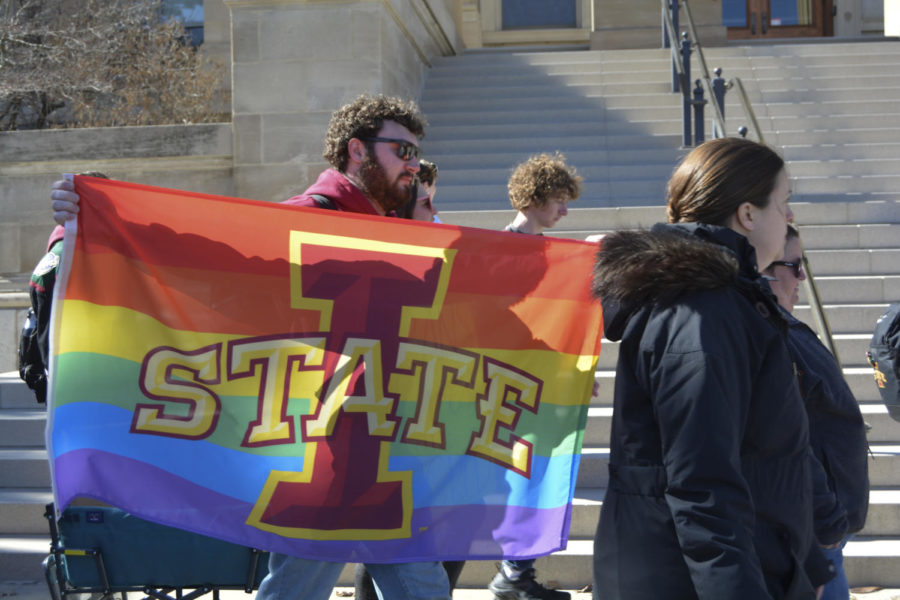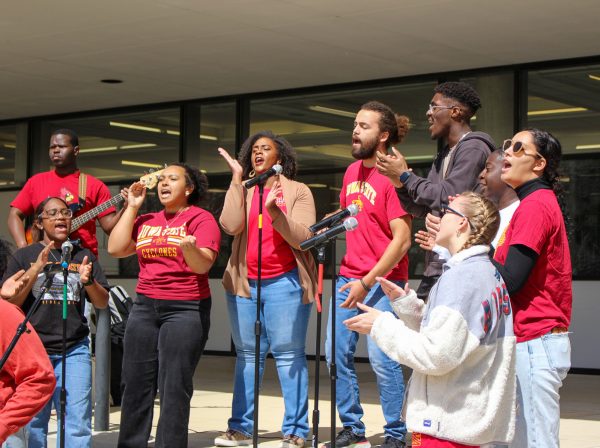Ames scores lower in LGBTQ+ inclusion than Iowa City
Ethan Rosonke holds an Iowa State pride flag during the LGBTQIA+ walkout on March 1, 2023.
For some members of the LGBTQ+ community at Iowa State, the university and Ames could make more strides toward building an inclusive environment.
In the past year, Ames received a score of 89 out of 100 on the Human Rights Campaign’s Municipal Equality Index, which measures how inclusive and safe cities are for members of the LGBTQ+ community. Other college cities in Iowa, such as Iowa City, received a perfect score of 100.
The campaign measures inclusivity based on laws, policies, services and leadership on LGBTQ+ equality for 506 cities across every state in America.
Ames received a perfect score in law enforcement and its lowest score in city efforts to include LGBTQ+ residents in services and programs.
Max Veasman, a freshman in English and apparel, merchandising and design, said they think Iowa City probably has a stronger queer community since most larger college cities do.
Veasman also said the difference could stem from a variety of factors such as education systems and the level of open-mindedness people have.
“Iowa State is truly known for its engineering, which usually attracts a more right-leaning student body,” Veasman said, “which is not directly correlated but often related to a more homophobic or transphobic environment.”
While Veasman feels there is not much physical discrimination based on gender and sexual orientation on campus, social discrimination is present.
“I notice the many stares and glares I receive from people when I am deciding to be more flamboyant in my gender expression, and I have many friends who would talk about a similar experience,” Veasman said. “The queer community I have been in contact with always seems to be holding their breaths until they have reached a safer destination.”
Veasman is not alone in sensing discrimination on campus. Julia Stoll, a sophomore in fashion communication and journalism and mass communication, has also felt discrimination but said it is not a high amount.
Stoll and Veasman also acknowledge the availability of resources on campus and the queer representation found in community events.
“I think ISU has a lot of different resources for a lot of different people to feel a sense of community and belonging,” Stoll said.
Taylor Velgersdyk, a sophomore in environmental and climate sciences, said events on campus are always open-minded and friendly to those who want to participate, and there are events specifically for LGBTQ+ members.
Velgersdyk said she has felt the most comfortable in the band, where the members and directors create an inclusive environment. As a member of the marching band and other musical groups, Velgersdyk said she has experienced a lot of diversity within the LGBTQ+ community.
“Last spring, Big Wigs Bar hosted a bingo fundraiser for the band, which not only was good for the band but made me feel like the band supported me and others in the LGBTQ community,” Velgersdyk said. “They make it a priority for everyone to feel welcome.”
Big Wigs Bar is Ames’ only gay bar and puts on drag shows. Velgersdyk said along with Big Wigs Bar, places like Dog-Eared Books host events for LGBTQ+ residents.
“In Ames, I see lots of establishments with Pride flags to show support which makes me feel safe and included, specifically Dog-Eared Books, Heroic Ink and many bars in Ames,” Velgersdyk said. “I do feel like the city itself is a safe space.”
Stoll also said she has seen this support but has been able to see more features and inclusion of the LGBTQ+ community in downtown Iowa City.
“I think Ames could do a better job of ensuring LGBTQ+ residents are included in the city’s community,” Stoll said. “Iowa City does a good job of being an open community and offering events or subgrouped communities that include LGBTQ+ individuals.”
Stoll said the city government encourages safe and inclusive protesting. Rallies and protests are more common, according to Stoll, and the city often has designated spots downtown where people can gather to protest.
“There could always be improvements for inclusivity,” Velgersdyk said, “but having public resources and large events like Pride are a great start.”
Your donation will support the student journalists of the Iowa State Daily. Your contribution will allow us to purchase equipment, send our student journalists to conferences and off-set their cost of living so they can continue to do best-in-the-nation work at the Iowa State Daily.

















